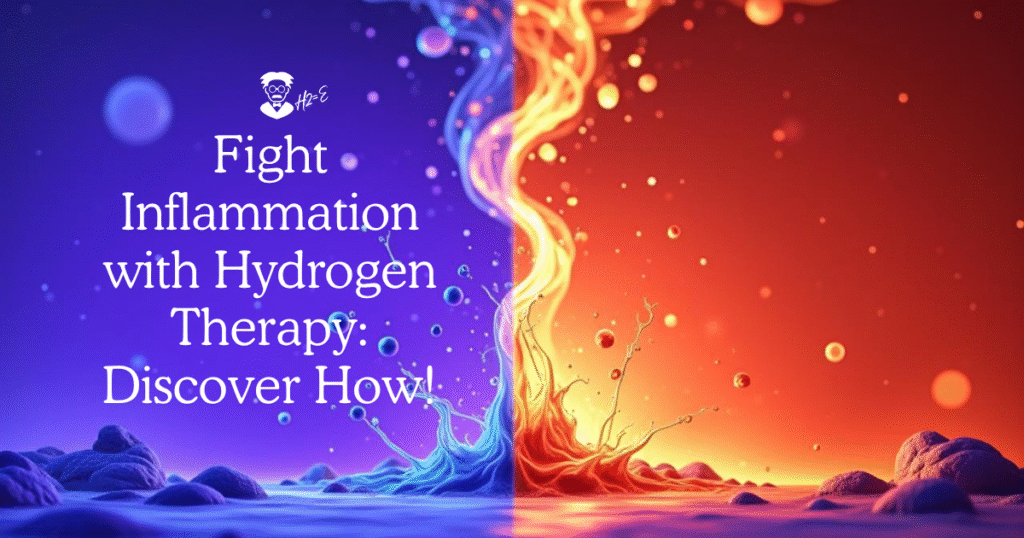Inflammation is a common culprit behind many health issues, from chronic pain to serious diseases. While various anti-inflammatory strategies exist, molecular hydrogen therapy is emerging as a promising novel approach. Let’s dive into what molecular hydrogen is, how it works, and its potential benefits for reducing inflammation.
What is Molecular Hydrogen Therapy?
Molecular hydrogen, also known as H2, is the simplest and smallest molecule in the universe. Molecular hydrogen therapy involves introducing molecular hydrogen into the body, typically through methods like drinking hydrogen-rich water, inhaling hydrogen gas, or taking hydrogen-releasing tablets. This therapy is gaining traction in the health and wellness world due to its potential therapeutic effects.
How Does Molecular Hydrogen Work?
The key to molecular hydrogen’s potential lies in its unique properties:
- Selective Antioxidant: H2 selectively targets harmful free radicals, such as hydroxyl radicals, without affecting beneficial ones essential for cellular function. This targeted approach minimizes oxidative stress.
- Anti-inflammatory Effects: Molecular hydrogen can modulate inflammatory pathways, reducing the production of pro-inflammatory cytokines and other inflammatory mediators.
- Improved Cell Signaling: H2 can influence cell signaling pathways, promoting cellular health and resilience.
- Enhanced Energy Production: Some studies suggest that H2 can enhance mitochondrial function, leading to improved energy production at the cellular level.
Potential Benefits for Reducing Inflammation
Research suggests that molecular hydrogen therapy may offer several benefits for reducing inflammation:
- Reduced Chronic Pain: By mitigating inflammation, H2 may alleviate chronic pain conditions such as arthritis and fibromyalgia.
- Improved Gut Health: H2 can help reduce inflammation in the gut, potentially alleviating symptoms of inflammatory bowel disease (IBD) and improving overall digestive health.
- Enhanced Athletic Performance: Athletes may benefit from H2’s anti-inflammatory properties, which can reduce muscle damage and soreness after exercise.
- Neuroprotective Effects: Studies indicate that H2 may protect against neuroinflammation, potentially reducing the risk of neurodegenerative diseases.
Molecular Hydrogen Therapy vs. Other Anti-Inflammatory Approaches
NSAIDs (Nonsteroidal Anti-Inflammatory Drugs)
- Commonly used to reduce pain and inflammation.
- Can have side effects such as stomach ulcers and cardiovascular issues.
- Provide symptomatic relief but does not address the underlying cause of inflammation.
Molecular Hydrogen Therapy
- Targets the root causes of inflammation by selectively neutralizing harmful free radicals.
- Generally considered safe with minimal side effects.
- May offer long-term benefits by promoting cellular health and resilience.
- Easy to incorporate into daily routines.
- May enhance the effectiveness of dietary interventions.
- Can complement dietary changes by providing an additional layer of antioxidant and anti-inflammatory support.
Conclusion
Molecular hydrogen therapy holds great promise as a novel approach to reducing inflammation and improving overall health. Its selective antioxidant properties and ability to modulate inflammatory pathways make it a compelling option for those seeking natural and effective ways to manage inflammation. While more research is needed, the existing evidence suggests that molecular hydrogen therapy may offer a valuable tool in the fight against inflammation and its associated health problems. Always consult with a healthcare professional before starting any new therapy
Sources
There have been numerous scientific studies that have been published in the US National Library of Medicine on the effects of Hydrogen reducing Inflammation, some of these studies are…
- Molecular Hydrogen Reduces LPS-Induced Neuroinflammation
- Molecular hydrogen in the treatment of acute and chronic neurological conditions:
- Molecular Hydrogen Therapy Ameliorates Organ Damage Induced by Sepsis
- Molecular hydrogen regulates gene expression by modifying the free radical chain reaction-dependent generation of oxidized phospholipid mediators

